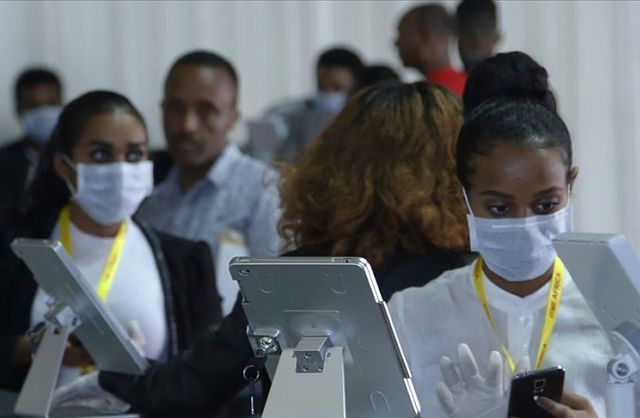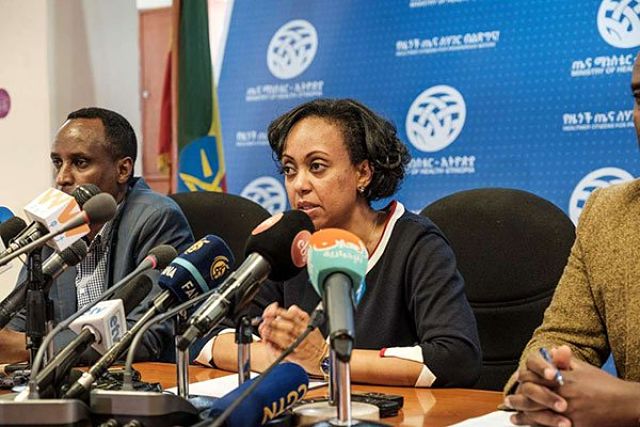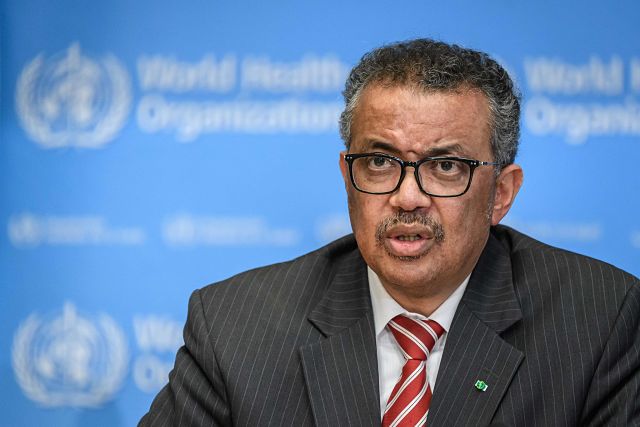 Prime Minister Abiy Ahmed says steps necessary after new coronavirus cases rise. (AA)
Prime Minister Abiy Ahmed says steps necessary after new coronavirus cases rise. (AA)
By Addis Getachew
UPDATEd: March 16th, 2020
Ethiopia Closes Schools, Bans Public Events
ADDIS ABABA — Ethiopia on Monday closed schools across the country and banned all public gatherings, including sports events, for 15 days.
The decision was announced by Prime Minister Abiy Ahmed after consultations with top officials on measures to avert a COVID-19 outbreak in the country.
In a televised message, the premier said the steps were necessary after four new cases were confirmed in Ethiopia over the past 24 hours, raising the total to five.
Among the new cases are two Japanese and an Ethiopian national who had been in contact with the country’s first patient, a 48-year-old Japanese citizen.
The fourth case was an Ethiopian man who recently returned from Dubai.
Ahmed said his government was making efforts to provide protective face masks, medical kits, and disinfectants, including sanitizers, for the public.
He announced that government vehicles would be used for public transport to ease the burden on the existing system.
With only primary and secondary schools being closed for now, Abiy said that university students would be provided all essential care at their respective campuses.
After emerging in Wuhan, China, last December, the coronavirus has now spread to at least 146 countries and territories, according to the World Health Organization (WHO).
The global death toll is nearly 6,500, with around 165,000 confirmed cases.
While the WHO recently declared the global outbreak a pandemic, its head Tedros Adhanom Ghebreyesus said the situation was controllable.
In his remarks at a March 3 briefing on COVID-19, Tedros also pointed out that the mortality rate from the virus was around 3.4%.
—
List of African Countries with Coronavirus Grows as Kenya, Ethiopia, Sudan Report Cases

Dr Lia Tadesse, Minister of Health of Ethiopia, addresses a press conference after the first case of Covid-19 coronavirus was detected in Ethiopia, in Addis Ababa on March 13, 2020. (Photo: AFP)
France24
Africa had until now largely been spared the rapid spread of COVID-19, which has infected at least 135,000 people and killed around 5,000 worldwide.
Most of Africa’s reported cases were foreigners or people who had travelled abroad. Rapid testing and quarantines have been put in place to limit transmission.
But concerns are growing about the continent’s ability to handle the disease.
Cases have been reported in Morocco, Tunisia, Egypt, Algeria, Senegal, Togo, Cameroon, Burkina Faso, Democratic Republic of Congo, South Africa, Nigeria, Ivory Coast, Gabon, Ghana, Guinea, Sudan, Kenya and Ethiopia.
Mauritania’s health ministry said late on Friday that its first coronavirus patient is a European man – nationality not specified – who had returned to Nouakchott on March 9 and had since been in quarantine.
The numbers of cases in most of the countries are still in single figures…
—
WHO Declares Coronavirus a Pandemic

Tedros Adhanom Ghebreyesus, the World Health Organization’s director-general, on Wednesday. He called for countries to help protect one another against a common threat. (Getty Images)
The New York Times
Updated: March 11, 2020
Coronavirus Has Become a Pandemic, W.H.O. Says
The spread of the coronavirus is now a pandemic, officials at the World Health Organization said on Wednesday.
“We have rung the alarm bell loud and clear,” said Tedros Adhanom Ghebreyesus, the W.H.O.’s director-general.
Dr. Tedros called for countries to learn from one another’s successes, act in unison and help protect one another against a common threat.
“Find, isolate, test and treat every case, and trace every contact,” Dr. Tedros said. “Ready your hospitals. Protect and train your health care workers.”
“Let’s all look out for each other, because we’re in this together to do the right things with calm and to protect the citizens of the world.”
Although this is the first pandemic caused by a coronavirus, “we also believe that this is the first pandemic that is able to be controlled,” Dr. Tedros added.
He pointed several times to the success of China, which has cut new infections from over 3,500 a day in late January to a mere 24 in the most recent daily count. The world is watching to see whether China can keep its numbers down as it gradually releases millions of city dwellers from quarantine and lets them go back to work.
South Korea and Singapore have also begun to see cases drop. But the rest of the world is seeing alarmingly rapid rises.
The W.H.O. is emphatically not suggesting that the world should give up on containment, Dr. Tedros said.
“We are suggesting a blended strategy,” he said, referring to a blend of containment and mitigation. “We should double down. We should be more aggressive.”
—
Related:
Tedros Adhanom Ghebreyesus: The Ethiopian at the Heart of the Coronavirus Fight
Join the conversation on Twitter and Facebook.

























